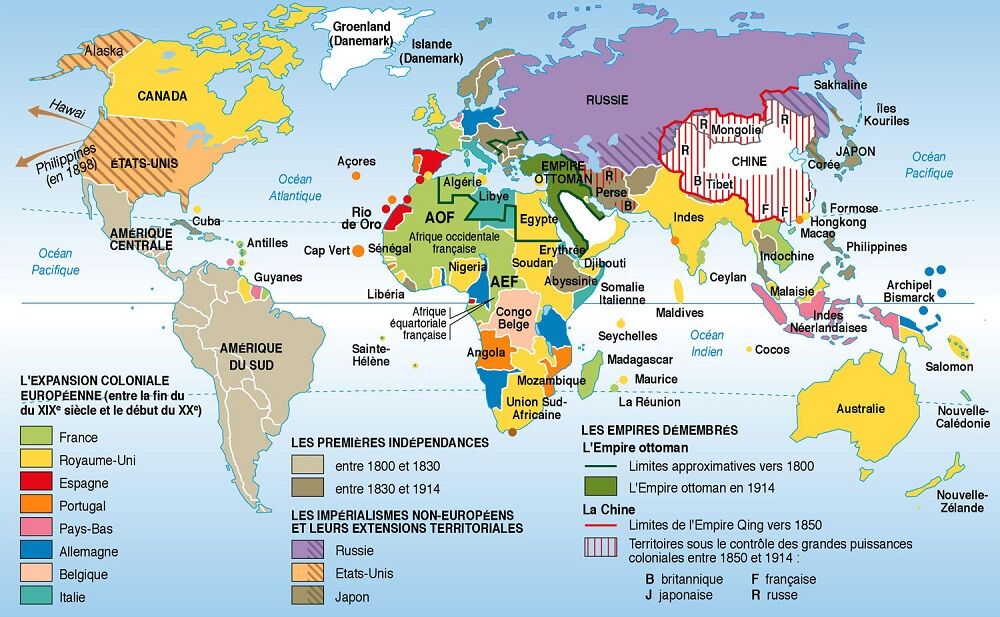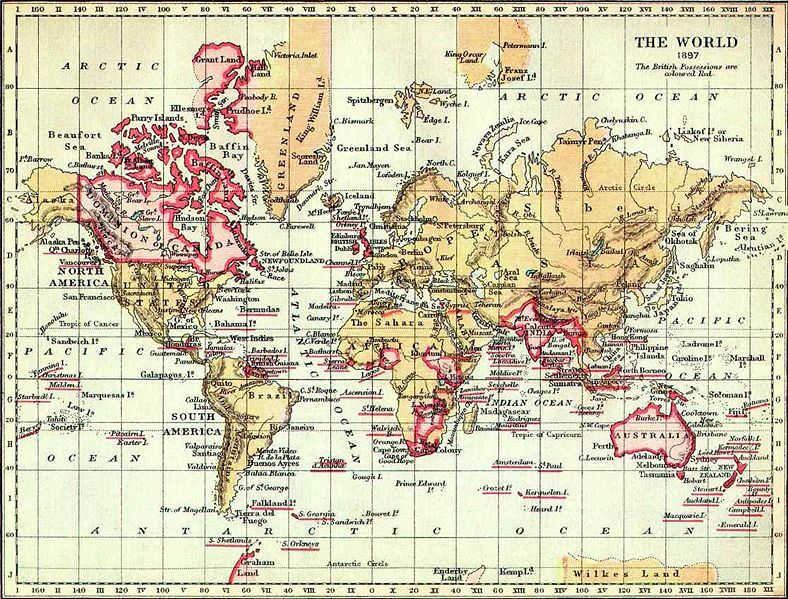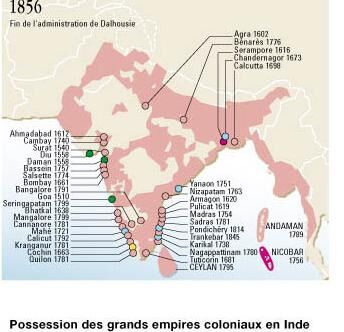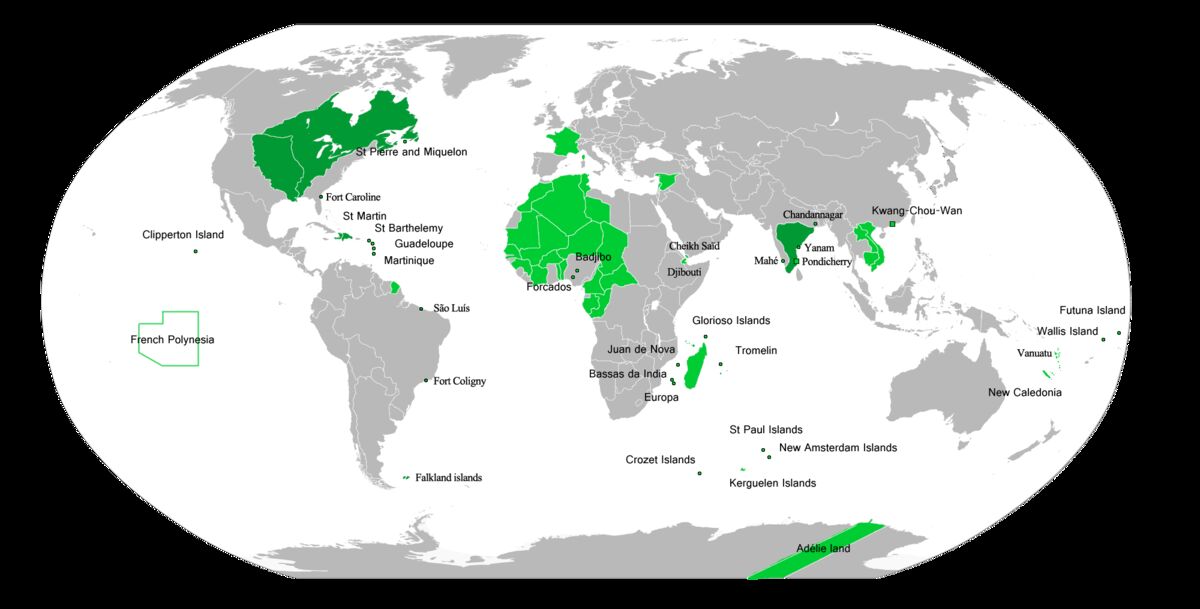The concepts covered in this factsheet go beyond those seen in secondary school. It is intended as a supplement for those who are curious to find out more.
By the time the countries of Europe had industrialised, there were few traces left of the colonial empires of the 16th and 17th centuries. In the 19th century, however, the great European powers once again embarked on vast colonial expansion.
Colonization is when a country takes possession of a foreign territory and controls its development.
The aim of these great new colonial empires was to control trade on a global scale, possess the natural resources and raw materials of non-industrialised countries and showcase their wealth and power to other colonial empires. In addition, the populations of the colonised territories provided them with a market in which to sell the many goods produced in the factories.
Imperialism is the policy of a country seeking to maintain or extend its domination over other peoples or territories.
Large empires are defined in terms of territory. An empire is a group of countries or territories under the control of a central authority. This central authority, the metropolis, manages and occupies several territories, the colonies.
These metropolises opted for an imperialist policy, i.e. a policy aimed at extending their domination throughout the world, to the detriment of other states. This domination could be military, economic, cultural or political. In this definition, the colony is subject to its metropolis. The imperialism of the 19th century is also known as colonialism, since domination was mainly exercised over conquered and colonised territories. The main aim of the great powers was to create huge colonial empires.
Colonialism is a political doctrine that advocates or seeks to justify the exploitation of a colony, territory or state by a foreign state.
On the other hand, metropolitan control could be exercised in various ways, depending on the purpose of the empire in a given territory. Generally speaking, a distinction can be made between colonies of settlement and colonies of exploitation.
In the settlement colonies, the metropolis wanted not only to control the territory, but also to populate it and collaborate in its industrial and technical development. In the colonies of exploitation, the metropolis exercised primarily economic power, since the aim was mainly to appropriate the colony's natural resources on behalf of the metropolis. The colonised territory could simply be annexed, which was colonization in its simplest sense: populating the territory, governing the territory and controlling the natural resources.
When the metropolises opted for a protectorate, the colony was administered through the intermediary of pre-existing local authorities. However, most decisions were taken indirectly by the metropolis. Dominion territories were exclusively settlements. In some cases, the colonies were still able to manage their territory and resources themselves.
A dominion is a word of English origin that designates an autonomous state within the British Empire. Canada was one of the dominions of the British Empire.
A protectorate is a state subject to a degree of control by a more powerful state. The protectorate is responsible for external relations, security and sometimes part of the administration. The protected state retains a degree of autonomy, which distinguishes the protectorate from colonisation.
In other cases, the metropolises did not necessarily want to exercise economic or political control. This is why many of them created zones of influence in which interests were shared between the empires and structures already in place.
The demographic expansion of the settlements can be explained in several ways: the population was growing and many individuals preferred to migrate to new countries, such as New Zealand, the United States, Canada and Australia. In other cases, demographic expansion can also be explained by the desire to expand the territory. Empires were also created for reasons linked to industrialisation. Indeed, the strong demand for raw materials justified the search for new natural resources. Many industrialists also wanted to expand their markets and find new outlets.
Partly because of their technical superiority, European countries and Europeans in general felt that their civilisation was superior. This judgment explains why many Europeans developed theories about the superiority of the White Man, which also explains the birth of racist ideas and ideologies. This idea of superiority was also intended as a justification for the colonial enterprise: Europeans imagined that they were on a mission to civilise.
In fact, the influence of the metropolises was very strong and extended to politics and the economy. What's more, many people were exploited for their labour during this period. Their tasks in the mines, on the plantations or in the railway companies were more often than not forced labour, even slavery.
There were several debates on the type of administration to be set up in the colonies. While some countries, such as France, opted for a policy of assimilation, the British model tended to favour association.
In a policy of assimilation, the colonists deny the indigenous people, their cultures, traditions and language, in order to bring them up to the same level of civilisation. In a policy of association, the metropolis respects the traditions and lets the people govern themselves. These questions arose above all in the settler colonies, since in the colonies of exploitation, the metropolises were generally content to put in place structures to encourage trade: ports, roads, railways, official currency, etc.
However, one of the debates that took place in the colonies concerned the development of the territory. The metropolises had the option of simply exploiting existing resources or developing infrastructures that would allow the territory to develop further.
In the 19th century, several European powers embarked on colonization. This was the case for England, France, Germany, Belgium and Holland. However, there is no doubt that France and England were the strongest powers at the time. In fact, by the end of the century, these two empires controlled more than a third of the world's surface.

Note: English image coming soon!
Colonial expansion has been highly concentrated on the African continent. Indeed, it was during the 19th century that Europeans began to settle and explore the continent.
In 1900, the British Empire covered 33 million square kilometres and was home to some 450 million people - a quarter of the world's population at the time.

Note: English image coming soon
The basis of this empire was the enormous economic and industrial strength accumulated since the start of the Industrial Revolution. It should be remembered that England was the first country to industrialise. British interests tended to focus on cotton and oil reserves, as well as steel.
The settlements all had dominion status, each with its own government. These colonies were Canada, New Zealand and Australia. The British Empire also took possession of South Africa, taking over the power previously held by Holland.
The British owned a number of colonies on every continent. In America, British power extended as far as Guyana and British Honduras. In Africa, the British Empire had seized a number of territories: Egypt, Sudan, Somalia, Uganda, Kenya, Tanzania, Zambia, Rhodesia, Nigeria, Ghana and so on. Finally, the largest British colony was undoubtedly India.

Note: english image coming soon!
In addition to these territories, England held a number of trading concessions in China, as well as several relays used as ports and trading posts.
In 1900, the French Empire was slightly smaller than the British Empire: 11 million square kilometres, with a population of 50 million. Nevertheless, it was the most powerful empire after Great Britain,

Note: english image coming soon
The foundations of the colonial empire were laid by Louis-Philippe and Napoleon III. The colonisation of Algeria began in 1830. However, it was during the Third Republic that the real colonial expansion took place. In most of the French colonies, the administration was carried out by people from metropolitan France with the help of a few native managers. However, these managers had very limited power.
The main settlements of the French Empire were in the Maghreb, in North Africa, with possessions such as Algeria, Morocco and Tunisia. In Africa, France's main holdings were in exploitative colonies all over the continent: Mauritania, Mali, Niger, Upper Volta, Chad, Senegal, Ivory Coast, Dahomey, Congo, Gabon, Central Africa, Madagascar and Somalia. In Asia, France occupied several regions of Vietnam, Cambodia and Laos, as well as several trading posts in China. The French Empire also extended to other parts of the world, including French Guiana, the West Indies, Saint-Pierre and Miquelon, India, French Polynesia, New Caledonia and the New Hebrides.
From 1880 onwards, a number of other countries embarked on vast colonization projects. Here are the main facts about each country.
- Belgium took possession of the Congo;
- Spain established colonies in the Sahara and Spanish Guinea;
- Portugal established colonies in Angola, Mozambique, Goa and Macao;
- The Netherlands took Guiana, Indonesia and New Guinea;
- Italy took Libya, Somalia and Eritrea;
- Germany controlled Togo, Cameroon and south-west Africa, as well as owning a few trading posts in China;
- Russia undertook colonisation campaigns to the east, but soon clashed with Japan.
At the time, there were also two new and increasingly powerful empires: Japan and the United States. Japan, having emerged from its period of seclusion, was opening up to the world and rapidly industrialising. The United States was also increasingly present on the international stage. As well as colonising the Philippines, the United States was industrialising its entire territory. It was the Americans who undertook the construction of the Panama Canal, which they controlled.

Note: English image coming soon
From then on, the United States only strengthened its ambition to act on the international stage. Until the Second World War, the United States continued to increase its power. Early on, the United States came out against colonialism. The Americans criticised the superior attitude of the European colonists. Moreover, when territories were colonised by European powers, the United States could not create new markets. Despite these new empires, European domination of the entire planet lasted until 1939, thanks to its economic, cultural, historical and colonising power.
As each country wanted to control as much territory and as many natural resources as possible, strong tensions developed over the years. While England was definitely the most powerful empire at the beginning of colonization, Germany slowly took over this position. Germany was becoming increasingly industrialised and had large quantities of goods to sell.
However, tensions were not limited to the European powers. New political players (Japan, the United States) were also in the race, and were not shy about asserting their power. Several conflicts broke out in the 19th century and before the First World War. In fact, certain tensions were partly responsible for the outbreak of the First World War.
Although metropolises provided the material and technical means to develop and industrialise, they also imposed their values and products. This domination covered all aspects (political, economic and cultural) and tended to erase or deny local values and traditions. What's more, in the exploited colonies, the new rulers favoured the cultivation and exploitation of raw materials, to the detriment of the subsistence crops grown by the peasants. Since the Europeans were convinced that they were bringing the benefits of civilisation to these territories, their practices were not called into question. A number of religious missions also took part in the colonising activities, with the aim of converting the local population.
Regardless of the colonization policy adopted by the metropolis, the appropriation of land disrupted the culture of the colony. The traditional framework was shattered by the massive arrival of foreigners, industries and exploitation sites. And yet, in many cases, it was this traditional framework that ensured the solidarity of the indigenous peoples.
Acculturation is the process by which a group or an individual assimilates a different, alien culture.
After colonization, habits and ways of thinking were no longer the same. What's more, all the traditional religious beliefs had been shaken by the religious missions. Many of those colonised were torn between accepting Western influence and remaining attached to tradition. They could not embrace new technologies without losing their customs.
In several colonies, the natives were exploited by the colonists. Many native Africans were even slaves. This exploitation of the colonised by the colonisers created major social inequalities. The bourgeoisie was often limited to the colonisers, while the natives were used as cheap labour.
European settlers often created centres in places that were more or less developed by the indigenous peoples. Around these points, however, there was rapid urbanisation. These new towns were often located near ports, plantations or natural resources (mines, oil, etc.).
Colonial empires have probably succeeded in extending urbanised and industrialised territories. However, the colonial enterprise paid little attention to the effective and sustainable development of the territory. The metropolises only developed those aspects that were profitable for them. This is why many of the countries colonised during this period are still considered to be developing countries. The techniques were imported, but not the social structures that would enable real, sustainable development. This is even truer in the former colonies, where the colonists were only interested in natural resources.
All these impacts led to numerous anti-colonial movements and gave rise to the desire for decolonisation, which emerged at the end of the First World War and even more strongly at the end of the Second World War.